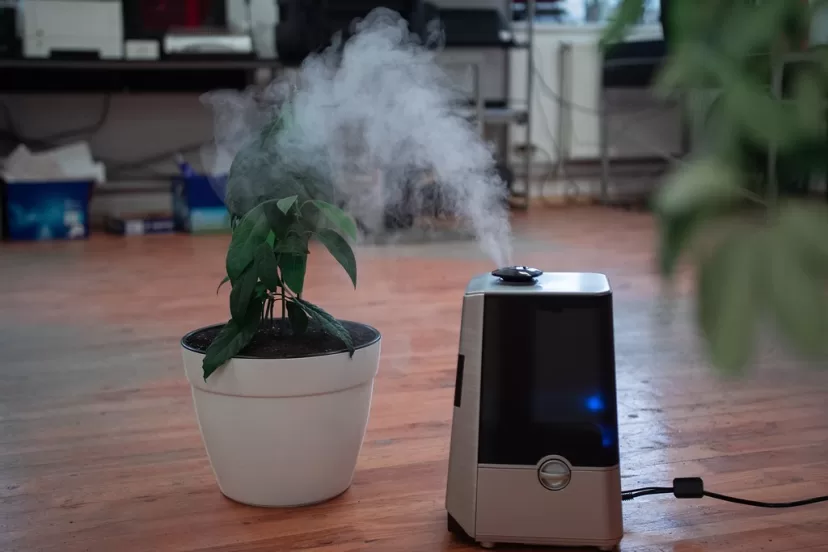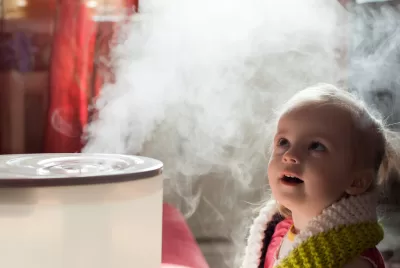Does a Humidifier Help With a Cough?
"We may earn a commission for purchases made using our links. Please see our disclosure to learn more."
If you’re wondering, “Does a humidifier help with a cough?” the answer is yes. In this guide, we’ll explore the benefits of using a humidifier for cough relief, the different types of humidifiers available, and best practices for using them safely and effectively.
What is a Humidifier and How Does It Work?
A humidifier is a device that adds moisture to the air in a room. It works by releasing water vapor into the air, which can help to increase the humidity levels in the room. This can be especially helpful during the winter months when the air tends to be drier.
Dry air can cause a number of problems, including dry skin, nosebleeds, and respiratory issues. By adding moisture to the air, a humidifier can help to alleviate these symptoms and make it easier to breathe.

Humidifier for Cough Relief
- A humidifier can add moisture to the air and relieve coughing caused by dry air.
- Using distilled water, cleaning the humidifier regularly, and monitoring humidity levels are best practices for using a humidifier for cough relief.
- Seeking medical attention is necessary if a cough persists or is accompanied by other symptoms.
Can a Humidifier Help with a cough?
Coughing is a common symptom of many respiratory illnesses, including the common cold, flu, and allergies. When you have a cough, the air passages in your throat and lungs can become irritated and inflamed, making it difficult to breathe.
Dry air can exacerbate these symptoms, making your cough even worse. By adding moisture to the air, a humidifier can help to soothe your throat and nasal passages, reduce nasal congestion, and ease coughing.

Types of Humidifiers and Which One is Best for Cough Relief
There are two main types of humidifiers: cool mist and warm mist. Cool mist humidifiers use a fan to blow air through a wick or filter that has been soaked in water. Warm mist humidifiers, on the other hand, use a heating element to boil water and release steam into the air.
Both types of humidifiers can be effective for cough relief, but there are some pros and cons to each. Cool mist humidifiers are generally safer to use around children and pets, as there is no risk of burns from hot water or steam. Warm mist humidifiers, however, can be more effective at killing bacteria and viruses in the air.
When choosing a humidifier for cough relief, it’s important to consider your specific needs and preferences. If you have young children or pets, a cool mist humidifier may be the safer choice. If you’re looking for a more powerful humidifier that can help to kill germs in the air, a warm mist humidifier may be a better option.
Benefits of Using a Humidifier for Cough Relief
Using a humidifier for cough relief can provide a number of benefits, including:
Soothing the throat and nasal passages
When the air is dry, it can cause your throat and nasal passages to become dry and irritated. This can make it difficult to breathe and can exacerbate coughing. By adding moisture to the air, a humidifier can help to soothe these symptoms and make it easier to breathe.
Reducing nasal congestion
Nasal congestion is a common symptom of many respiratory illnesses, including the common cold and flu. By adding moisture to the air, a humidifier can help to reduce nasal congestion and make it easier to breathe.
Easing coughing
Coughing can be a painful and uncomfortable symptom of many respiratory illnesses. By adding moisture to the air, a humidifier can help to ease coughing and make it easier to breathe.
Preventing dry skin, nosebleeds, and other symptoms caused by dry air
Dry air can cause a number of other symptoms, including dry skin, nosebleeds, and respiratory issues. By adding moisture to the air, a humidifier can help to prevent these symptoms and make it easier to breathe.

Best Practices for Using a Humidifier to Relieve Cough Symptoms
To use a humidifier safely and effectively for cough relief, it’s important to follow these best practices:
Use distilled water
Using distilled water in your humidifier can help to prevent the buildup of minerals and bacteria in the water tank. This can help to keep your humidifier clean and prevent the growth of harmful bacteria.
Clean the humidifier regularly
Cleaning your humidifier regularly can help to prevent the buildup of bacteria and mold in the water tank. It’s important to follow the manufacturer’s instructions for cleaning your humidifier, as different models may require different cleaning methods.
Place the humidifier in the right location
To get the most benefit from your humidifier, it’s important to place it in the room where you spend the most time, such as your bedroom or living room.
Monitor humidity levels
To prevent over-humidifying a room, it’s important to monitor the humidity levels in the air. A humidity level of between 30% and 50% is generally considered to be ideal for cough relief.

Precautions to Take When Using a Humidifier for Cough Relief
While using a humidifier can be a safe and effective way to relieve coughing, there are some precautions you should take to ensure your safety:
Avoid over-humidifying a room
Over-humidifying a room can lead to the growth of mold and bacteria, which can be harmful to your health. To prevent this, it’s important to monitor the humidity levels in the air and turn off your humidifier when the desired humidity level has been reached.
Use the humidifier for short periods of time
Using your humidifier for too long can also lead to the growth of mold and bacteria. To prevent this, it’s important to use your humidifier for short periods of time, such as a few hours at a time.
Monitor humidity levels to prevent mold growth
To prevent the growth of mold in your humidifier, it’s important to monitor the humidity levels in the air and turn off your humidifier when the desired humidity level has been reached.
Clean the humidifier regularly to prevent bacterial growth
Cleaning your humidifier regularly can help to prevent the growth of harmful bacteria and mold in the water tank. It’s important to follow the manufacturer’s instructions for cleaning your humidifier, as different models may require different cleaning methods.

Other Home Remedies for Cough Relief
In addition to using a humidifier, there are several other home remedies that can be effective for cough relief, including:
Drinking plenty of fluids
Staying hydrated can help to soothe your throat and reduce coughing. Drinking plenty of fluids, such as water, tea, and soup, can help to keep your body hydrated and alleviate coughing.
Using a saline nasal spray
Using a saline nasal spray can help to reduce nasal congestion and make it easier to breathe. Saline nasal sprays are available over-the-counter at most drug stores.
Taking over-the-counter cough medicine
Over-the-counter cough medicine can help to reduce coughing and make it easier to breathe. It’s important to follow the manufacturer’s instructions when taking cough medicine, as taking too much can be harmful.
Using honey or ginger for natural cough relief
Honey and ginger are both natural remedies that can help to soothe your throat and reduce coughing. Adding honey to tea or taking a spoonful of honey can help to alleviate coughing. Drinking ginger tea or taking ginger supplements can also be effective for cough relief.
When to Seek Medical Attention for a Cough
While using a humidifier and other home remedies can be effective for cough relief, there are times when it’s important to seek medical attention. You should seek medical attention if:
When a cough is accompanied by fever, chest pain, or difficulty breathing
If your cough is accompanied by a fever, chest pain, or difficulty breathing, it’s important to seek medical attention right away. These symptoms can be a sign of a more serious respiratory illness.
When a cough persists for more than a week
If your cough persists for more than a week, it’s important to seek medical attention. This can be a sign of a more serious respiratory illness that requires medical treatment.
When a cough is severe or interfering with daily activities
If your cough is severe or interfering with your daily activities, it’s important to seek medical attention. This can be a sign of a more serious respiratory illness that requires medical treatment.
Humidifier vs. Other Cough Remedies
While using a humidifier can be an effective way to relieve coughing caused by dry air, there are other cough remedies that can be effective as well. When deciding which remedy to use, it’s important to consider your specific needs and preferences.
Humidifiers are generally safe and effective for cough relief, but they may not be the best choice for everyone. Other cough remedies, such as over-the-counter cough medicine or natural remedies like honey and ginger, may be more effective for some people.
Personal Story: How a Humidifier Helped My Child’s Cough
When my daughter was six years old, she developed a persistent cough that kept her up at night and made it difficult for her to breathe. We tried over-the-counter cough medicine and honey, but nothing seemed to work. After doing some research, we decided to try using a humidifier in her room at night.
We purchased a cool mist humidifier and placed it on a dresser across the room from her bed. We filled it with distilled water and turned it on before bedtime. The first night, my daughter slept soundly and didn’t cough once. We continued to use the humidifier every night for a week, and her cough gradually improved.
Not only did the humidifier help relieve her cough, but it also made the air in her room feel more comfortable. She no longer woke up with a dry throat or stuffy nose. We continued to use the humidifier throughout the winter months, and her cough never returned.
Using a humidifier was a simple and effective solution for my daughter’s cough. It added moisture to the air and helped soothe her throat and nasal passages. I would highly recommend trying a humidifier for anyone experiencing coughing caused by dry air.
Conclusion and Final Thoughts on Using Humidifiers for Cough Relief
Using a humidifier can be a helpful way to relieve coughing caused by dry air. By following best practices and taking precautions, you can use a humidifier safely and effectively for cough relief. Other home remedies, such as drinking plenty of fluids and using saline nasal sprays, can also be effective for cough relief.
However, if your cough persists or is accompanied by other symptoms, it’s important to seek medical attention. This guide has covered all the main points related to using a humidifier for cough relief and provided additional information on other cough remedies.
In conclusion, a humidifier can be an effective and natural way to relieve coughing caused by dry air. By using it correctly and taking precautions, you can enjoy the benefits of a humidifier for cough relief. However, if your cough persists or is accompanied by other symptoms, it’s important to seek medical attention.




